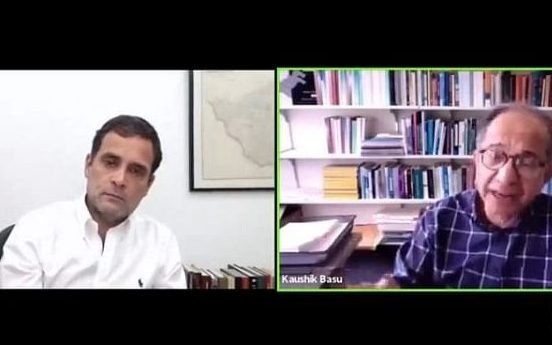Congress leader Rahul Gandhi once again finds himself at the center of controversy. His interview with renowned economist Kaushik Basu has created a ruckus between the Indian media and the ruling party.

Not only has the Bharatiya Janata Party targeted him during independent wheelchair discussions for his statements, but many senior leaders of Rahul’s own party are also questioning the timing, noting that elections to five states will take place in one and three weeks Are going to be
At a time when Rahul should focus on campaigning in the states, he is seen giving interviews on democracy, development and life in politics, India and the world.
The conversation has an international and large-scale urban audience primarily in India. Rahul forgets that he is not going to vote in these elections.
Furthermore, Kaushik Basu, who was the Chief Economic Advisor during the UPA government, has been a critic of Modi’s economic policies and programs and is not considered a neutral observer.
Rahul admitted in the interview that it was a mistake by his grandmother Indira Gandhi to enforce the Emergency.
The reference to emergency is unlikely to bring any political dividend. Rather, in states like Kerala and West Bengal, any recollection of the Emergency era is likely to drive away voters, especially senior citizens.
It is tantamount to achieving a self-goal, to provide free fodder to the BJP to attack the Congress during the election campaign in the states.
Rahul also attacked the BJP during the discussion, saying: “Democracy is being strangled in India. Institutions are attacked, we are not allowed to speak in Parliament, there is no recruitment in the judiciary now… There is a whole scale attack. “
The entry related to the emergency neutralizes Rahul’s allegation that the BJP is killing democracy in India. The BJP has accused Rahul of interviewing anti-India elements and damaging the country’s reputation by making such lewd statements.
Rahul said that the Emergency was different from the present scenario as the Congress did not have an attempt to occupy the institutional structure of the country, as the Rashtriya Swayamsevak Sangh was now attempting.
He further alleged that the RSS was comparable to the radical Islamists in Pakistan.
The minority community has a large presence in two states, Assam and West Bengal, where the BJP is in dispute. This statement is about charging the RSS cadre to work in favor of the BJP candidates and further polarizing the electorate in an already charged environment.
Rahul also did not miss the opportunity to attack 23 G-23 rebels in the Congress. Rejecting his attack on the demand to hold elections for organizational posts, including the post of president, Rahul Gandhi said: “I am the person who pushed the elections in youth organizations and student organizations and there was a severe beating in the press for this . I was literally crucified to make the choice. I was attacked by people from my own party. “
This is tantamount to washing dirty linen in public. At a time when the party needs to form a united front, this statement has widened the gap between the G-23 leaders and their supporters and Gandhi’s loyalists.
Anand Sharma (G-23) and Adhir Ranjan Chaudhary are engaged in a battle of words to incorporate the India Secular Front in Mahajot, West Bengal.
While the interview is part of Rahul’s public relations and brand-building practice, the timing, context, and selection of a mediator defeats the purpose.
Why is Rahul not speaking from Indian media outlets / channels and that too in Hindi or any other regional language? Voters from five states would certainly like to hear their views on various issues.
The most important part was missing from the interview: Rahul’s vision for New India and what is the roadmap to achieve it. He again failed to connect with the public in India with this interview.

